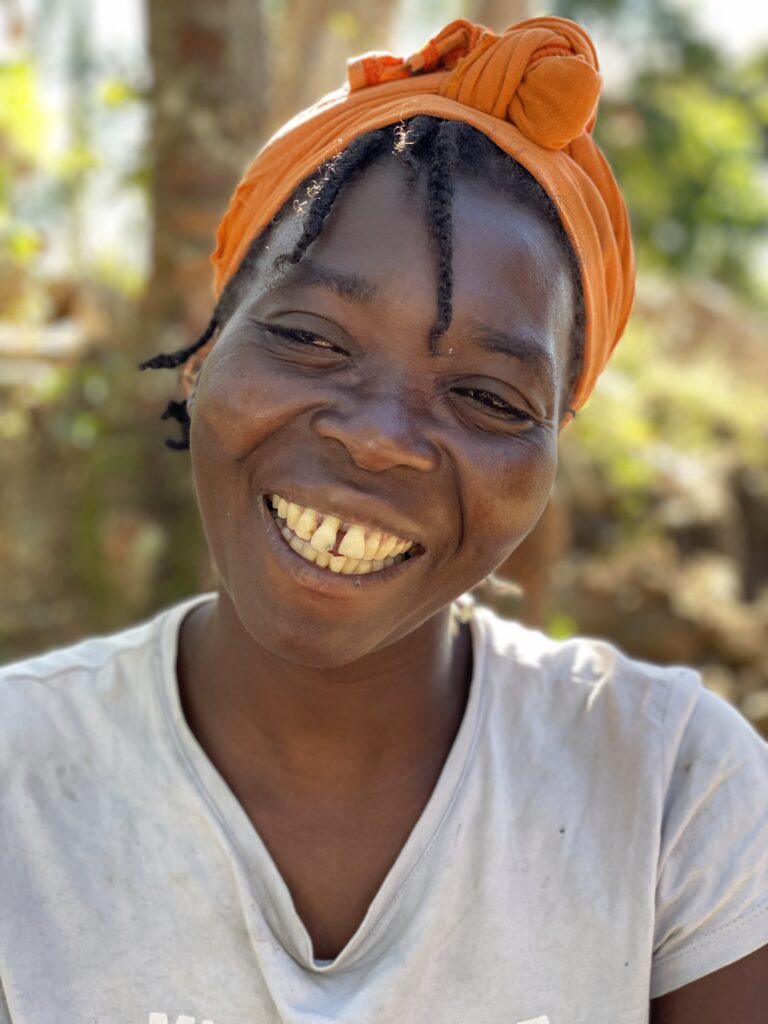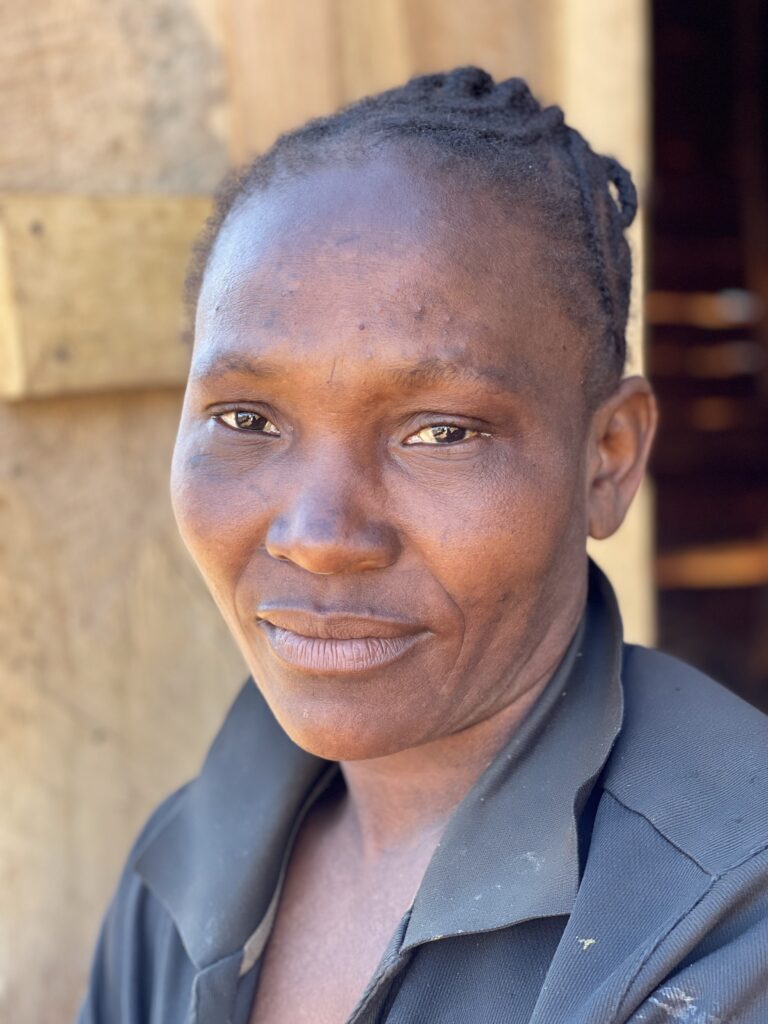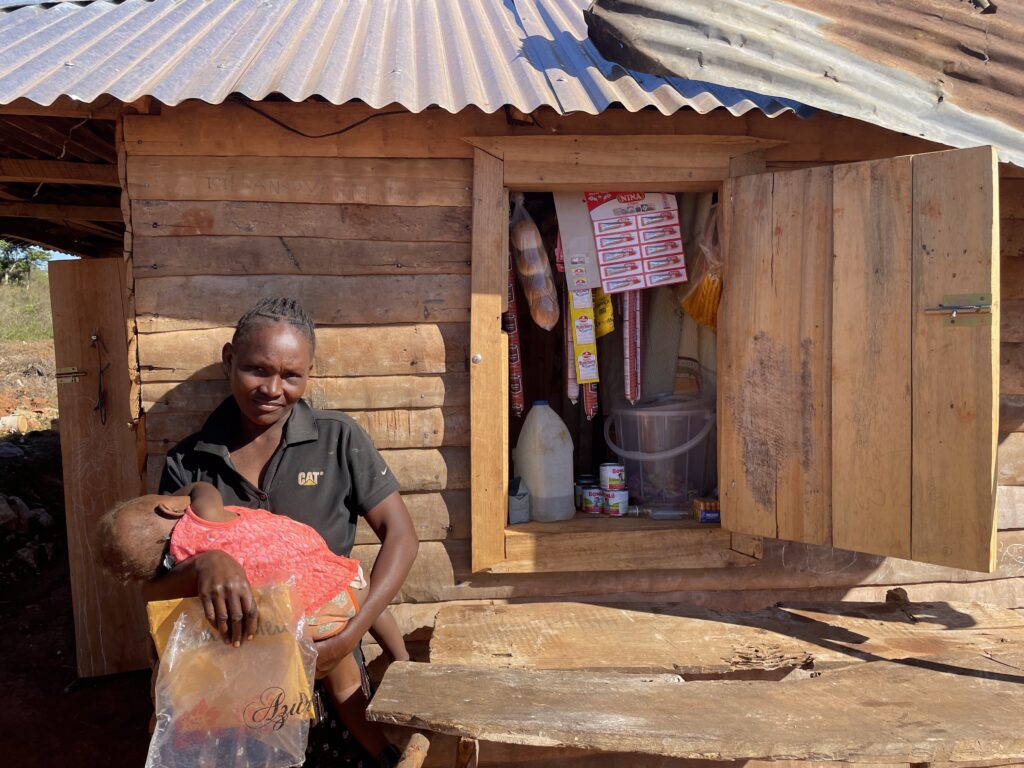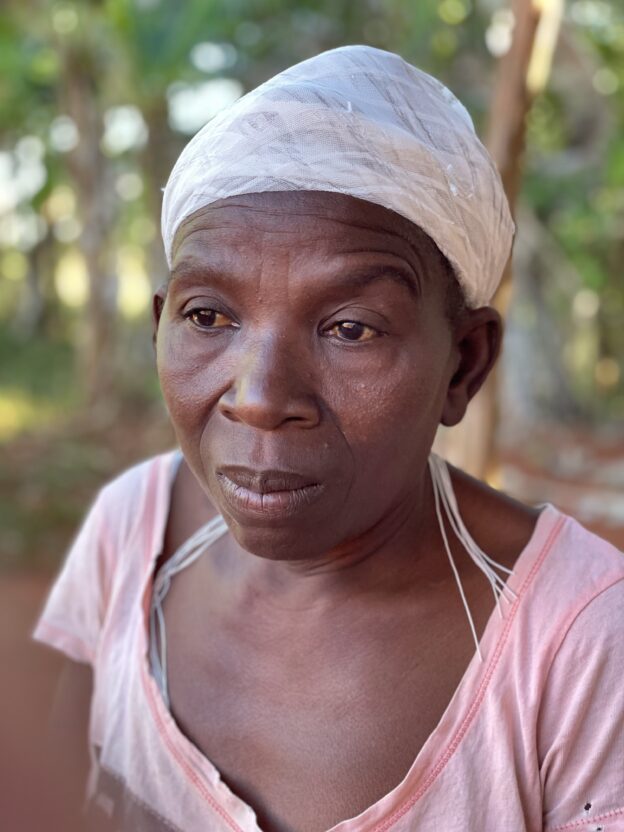Rosemène lives in Senadò with her teenage son. He is her youngest child. She was born and raised in Senadò, but she moved away when she met her first husband. They had four children together, but when he passed away, she could not see how to raise them by herself. By then, her mother was living across the border in the Dominican Republic, and the older woman asked Rosemène to send the children to her. They’ve been with their grandmother ever since.
Rosemène returned to Senadò, where she found an old family home should could inhabit. She had a child with another man, and he occasionally contributes some money to help her support the boy, but they haven’t been together as a couple for years. Most of the boy’s needs fall on Rosemène.
She’s done two principal things to support her son. She works in her neighbors’ fields when they will hire her, but that was never her preferred option. She always preferred to borrow money from friends or neighbors so she could buy sour oranges or meliton, a vegetable popular in Haiti. She would load a basket on her head, and hike more than two hours down the mountain to the market in Laskawobas. She would then sell her load, hike back home, repay her loan, and prepare for the next trip. Without a pack animal, the work was both physically demanding and limited. She could only sell as much as she could carry herself.
But she has not even been able to do even that much for a while. She developed a cavity, and it appears to have become infected to the point that she developed an abscess. Though the abscess was eventually lanced, the tooth continues to bother her. She can’t carry loads on her head at all anymore, so she and her boy have to make do with what little she can earn in the fields.
She bought a pig and two goats with the money the CLM program gave her to invest in business, but when she saw the the pig was getting sick, she sold it for meat. Selling a sick pig for meat in the Haitian countryside almost always means selling on credit, and that’s what Rosemène had to do. She had purchased it for 7,500 gourds, and she was able to sell it for 6,500, but she won’t be paid until June.
Her goats are doing better. They have been thriving under care from herself and her boy. One has given birth to its first kid, and the other is pregnant.
She has been making slow progress towards building a new home, but she may have reached an impasse. She borrowed 6,000 from her brother-in-law to buy the first load of palm wood planking she needs for the home’s walls, but when he asked her to repay him, she had to take out a loan from her VSLA. She was able to borrow the 6,000 gourds she needed, but she can not see how she will repay. It was a two-month loan, and with interest she’ll owe 3,120 this month, but she doesn’t have any ideas right now about where that money will come from. It is hard to see it coming from the little bit she can earn from field work, and she still can’t carry a load to market. And she has more building expenses waiting for her after that loan has been repaid.
If she is able to repay her loan, she has a plan for the savings she’ll receive when the cycle ends this summer. She knows the most important thing she can do for herself and her boy would be to get back into business, but she needs a pack animal to do it well. She hopes to be able to combine her savings with money from the sale of a goat to buy a donkey. She thinks she can buy one for 20-25 thousand gourds. “I know how to do business, a just need a little donkey to do it.”

Marie lives uphill from Rosemène, on an opposing offshoot of the main path through Senadò. She and her husband, Rodrigue, live with their three children. They have been working neighbors’ fields since before they joined the program, earning whatever the daily rate has been.
They have been able, for the most part, to feed the family and to send the children to school. “If you earn 500 gourds, yo might eat 300, but you try to save 200.” Paying for school, however, has involved borrowing money from the local credit union. They still owe 900 gourds of interest on the loan they took out to pay tuition.
But Rodrigue would also going down the mountain to central Laskawobas, where farmers pay lump sums of 1,500 gourds or more for a single job that lasts several days. These lump sums enabled the couple to to do most of the work towards building a home, but they never had the money to complete the work. The house has been sitting for years with doorways where the doors should be and incomplete walls.
They were able to complete work on their home quickly once they received CLM support. They bought the lumber they needed for doors, and hired a carpenter to make and mount them. They bought some additional planking, and they had the carpenter complete the open walls.
Marie is excited about the livestock she has been able to acquire. “Someone was letting me take care of their goat.” Normally, she might eventually be paid in kind from the goat’s offspring. “But now I have two goats of my own. One already had a kid, and the other is pregnant.” She also bought a pig and a turkey.
She has a plan. She wants to sell offspring from her livestock, add the money to what she has saved in her VSLA, and buy a cow. “Once your cow has a calf, you can begin selling milk.” She explains that a gallon sells for 500 gourds, and she can use that money to feed her kids, though she and Rodrigue plan to continue doing the fieldwork they have always done as their main source of income.

Ivronie lives on the main path between Senadò and the center of Gwo Moulen, but she hasn’t been there for long. She was a single widow, raising three children by herself, living in a home that did not belong to her. She would take care of the children by working in they fields that her late husband left for her and with a business bringing produce to market.
She met a man. He’s showing himself to be a good partner, willing to help her take care of the kids she already had. He had purchased a small piece of land, but neither had the money to build a home on it. He also bought a horse to help her with her commerce. When, however, she gave birth to another child, her first with her new husband, she was no longer able to go to market. “I have no one who can watch the children consistently. My husband has to be away too.”
Joining CLM changed her situation in several ways.
Using support from the program, the couple has been able to build a new home on the land they own. They installed a window on one side of the home that Ivronie can use to run a small grocery business. “It’s not a good business. Neighbors buy on credit, and it’s hard to get them to pay.” For now, however, with a baby in her arms, it is the best she can do. Her husband takes the baby on Mondays, when she goes to market to buy. She hopes that when her baby is a little older she’ll be able to do more business going back and forth to the market in Laskawobas.
As small as it is, her business is important to her because it enables her to save money in her VSLA every week. The livestock she bought with funds from the program is starting to prosper, and she hopes, like Marie, that when her VSLA cycle is over she will have enough money between her savings and what she can ear from selling off other livestock to buy a cow. Unlike Marie, she does not have a plan for her cow once she buys one, but she know she wants one.

